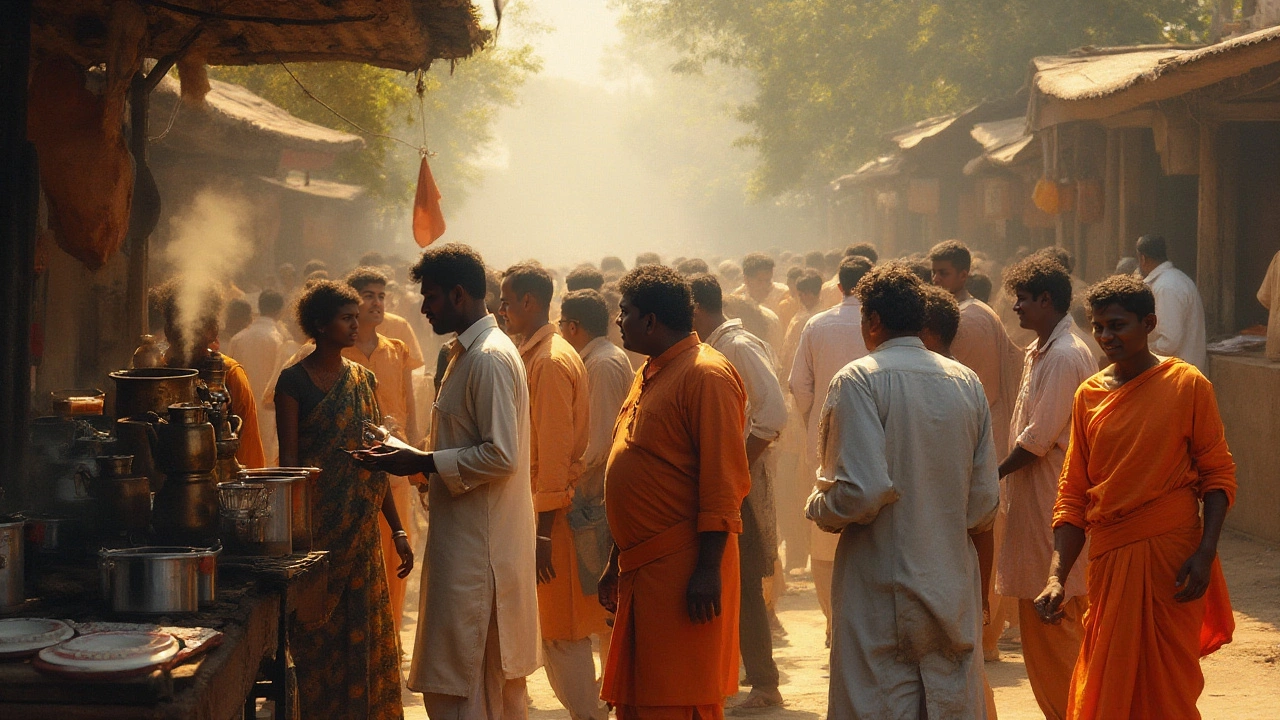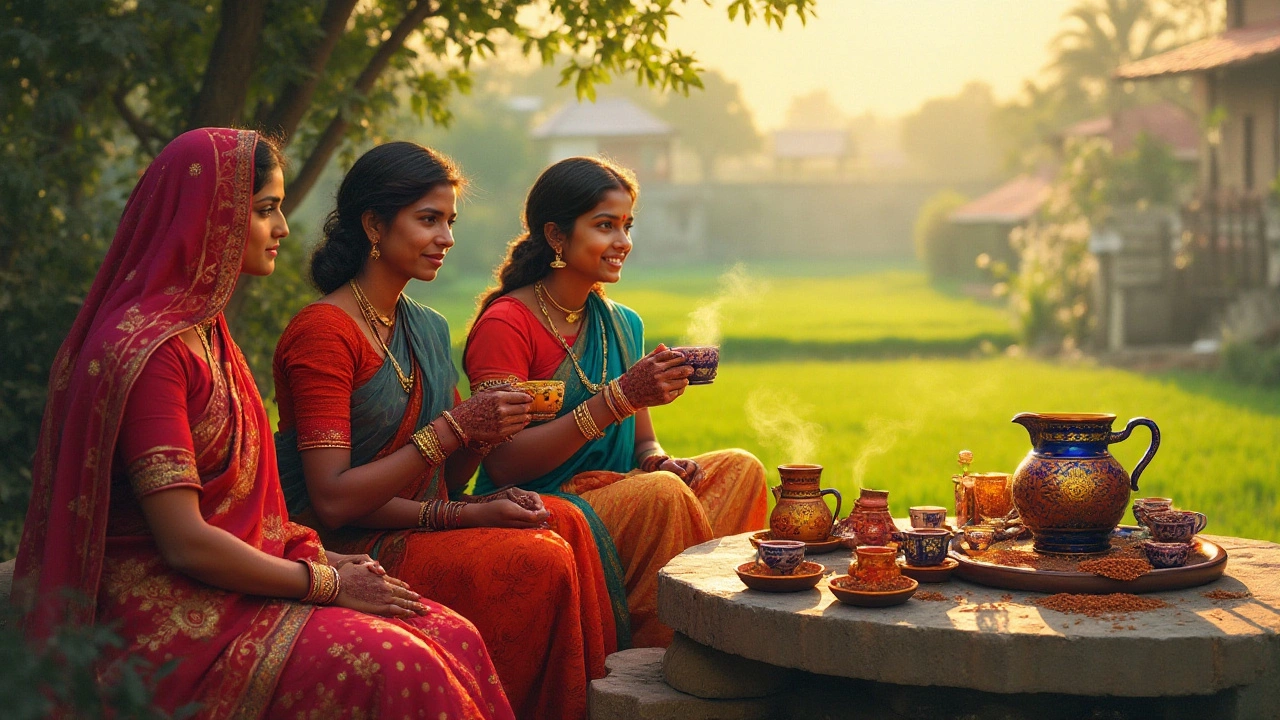When the sun rises in India, billions of people wake up to a steaming cup of their favorite morning beverage. For many, the day doesn't properly start without this ritual. Be it a strong cup of chai with a dash of spices or a robust filter coffee brewed with precision, each sip carries the warmth and tradition of the Indian household.
These beverages are not just drinks but are deeply woven into the country's cultural fabric. Across the length and breadth of India, different regions have their own unique offerings, influenced by local tastes, climates, and histories. It's fascinating to see how a simple morning drink can vary from one part of the country to another, yet universally symbolize comfort and readiness.
- Chai: The Heart of Indian Mornings
- Filter Coffee: South India's Wake-Up Call
- Regional Variations and Lesser-Known Brews
- Tips for Preparing Authentic Morning Beverages at Home
Chai: The Heart of Indian Mornings
The essence of morning in India is almost inseparable from a piping hot cup of chai. This simple blend of tea leaves, milk, water, sugar, and a symphony of spices like cardamom, ginger, and cloves, creates an unparalleled harmony that invigorates the senses. Chai, meaning 'tea' in Hindi, has become synonymous with warmth and hospitality. With each region giving its own spin on the classic recipe, chai reflects the diverse cultural tapestry of India. In Northern India, a hint of saffron might be added during special occasions, infusing the drink with a golden hue and a touch of opulence. Meanwhile, in the West, a masala chai rules, fragrant with a secret family spice mix that varies from household to household.
Drinking chai in India is more than a morning routine; it's an experience where time seems to slow down. It's about the laughter shared over a cup with friends at a roadside tea stall or the quiet moments of reflection on a veranda overlooking the verdant fields. The popularity of chai has soared beyond borders, becoming an international ambassador of Indian culture. A survey in 2022 showed that 90% of Indian households consume chai daily, making it an integral part of life. Chai has this mesmerizing ability to bring people together, transcending social and cultural barriers, and weaving a comforting bond over stories untold.
The art of brewing chai is perfected across generations, where patience is key. The process begins with boiling water and tea leaves before the spices are introduced, allowing their flavors to meld. Sweetness is added, usually more than Western tastes expect, creating a rich, creamy drink that leaves a warm trail of comfort down to the belly. Many people prefer their chai strong, boiling it repeatedly until the desired robustness is achieved. Here, every step is deliberate, a dance performed daily with meticulous precision. For those interested in exploring the depths of chai culture, it's worth noting the words of esteemed Indian culinary author, Madhur Jaffrey:
"Chai is the elixir that wakes up the nation, filling its soul with warmth and energy."Whether sipping it at dawn or dusk, chai holds an esteemed place in India's heart, a timeless tradition that continues to captivate with each steaming cup.
Filter Coffee: South India's Wake-Up Call
Down in the South of India, a day often breaks with the aromatic embrace of filter coffee, a staple that is nothing short of a daily ritual for many households. This beloved concoction isn’t just coffee; it’s an experience that starts with the fine art of blending the perfect coffee powder, often a finely balanced mix of Arabica and Robusta beans. Famous for its rich flavor and distinctive decoction, it’s made using a traditional metal filter that looks deceptively simple yet yields a brew that is anything but.
The preparation of this strong Indian breakfast drink is an affair to be savored. Thoughtfully brewed in a special metal percolator called a coffee filter, the technique involves slow, meticulous dripping where water is allowed to steep through the coffee powder. This produces a thick, fragrant decoction to which boiling milk and sugar are added, rendering the coffee with a characteristic layer of froth at the top. The resulting brew is both strong and creamy, a perfect morning jump-start.
What makes filter coffee stand apart is the community and history it represents. In bustling coffee houses and quiet kitchen corners alike, it's a beverage meant to indulge the senses and encourage great conversation. It's interesting to note that before independence, coffee was predominantly grown in the estates of Karnataka and Kerala, regions within South India, which today stand as symbols of the lush abundance of Indian coffee cultivation. For those fortunate enough to travel through Tamil Nadu or Karnataka, the delightful aroma wafting from roadside stalls or chicory-perfumed cafés captures the essence of the South Indian way of life.
In fact, there's a touching endorsement from renowned Indian food historian K. T. Achaya, who noted that, "The cultural ethos of South India would be incomplete without its filter coffee." This powerful statement reflects not only its popularity across generations but also its role in fostering cultural identity. There is a genuine camaraderie in the coffee culture here, creating places where stories are shared and relationships are forged over cups of this delicious beverage.
Interestingly, a survey once revealed that more than 60% of households in the South began their day with traditional filter coffee, a testament to how deeply it is interwoven with daily routines. It's more than just a wake-up call; it’s a cherished moment underlined by tradition and love. Crafting an authentic filter coffee at home can be an artistic endeavor, involving the right filter setup, choice of coffee blend, and patience to perfect that essential froth, making it a unique adventure for coffee enthusiasts new to this cherished morning ritual.

Regional Variations and Lesser-Known Brews
India's vast landscape and diverse cultures contribute to a fascinating spectrum of morning beverages, each with its own flair and story. In the northern reaches, particularly in Punjab, the comforting allure of a glass of sweetened lassi is sometimes chosen over the ubiquitous chai. This yogurt-based drink, often flavored with a touch of rose water or cardamom, provides a cooling start to the day. It's a nourishing choice, especially in the sweltering summer months, popular among those seeking refreshment alongside their breakfast.
Down south, apart from the renowned filter coffee, beverages like Neer Mor, a refreshing buttermilk concoction spiced with curry leaves and ginger, can be found. The coastal states have a rich tradition of crafting drinks that incorporate local ingredients such as coconut water and jaggery. In Kerala, for instance, morning routines might include a cooling Toddy or ‘Kallu,’ a mildly alcoholic drink extracted from palm trees, though it's much more than a morning affair.
In the eastern regions, such as West Bengal, you might find Cha or spice-infused black tea being brewed as a part of the morning ritual. Sometimes accompanied by plump, sugar-filled rasgullas, this duo sets the tone for a bright start. Moving towards Assam, the state known for its tea plantations, locals take pride in their black tea, a robust concoction that invigorates and stimulates the senses.
The northeast of India offers completely unique experiences. For example, in Sikkim, butter tea, known as 'Nepali Chiya', is a traditional choice, made by churning tea leaves with butter and salt. It delivers not just warmth but a rich, creamy taste, keeping the chill at bay. This variation, linked to Tibetan culture, reflects the region's strong ties with its neighboring countries.
Sidestepping towards the west, in states like Gujarat and Rajasthan, the seasonal Bajra Raab captures attention. This healthy drink uses pearl millet flour, jaggery, and spices, serving as an energy booster on a brisk morning. Whether fighting a cold or simply beginning the day, it symbolizes how traditional wisdom meets modern needs. The locals often regard it as more than just a beverage, viewing it as a symbol of resilience against the harsh desert environment.
"In India, every region's drink has a history and can tell you a lot about its people and traditions," says Manu Chandra, an acclaimed chef. This sentiment emphasizes how Indian morning drinks are not merely beverages—they are windows into a rich tapestry of heritage.
These regional variations highlight the incredible diversity within Indian breakfast drinks and reiterate the idea that in India, a simple drink is more than just a start to the day—it's a ritual, a comfort, a cultural expression. Exploring these drinks presents an adventure as much about the journey as the destination. They encourage us all to take a sip of India’s deep-rooted traditions, one cup at a time.
Tips for Preparing Authentic Morning Beverages at Home
Bringing the authentic taste of traditional Indian morning beverages into your home is a delightful and rewarding experience. Whether it's crafting the perfect cup of chai or mastering the art of filter coffee, a few simple tips can make your homemade drinks rival those from the bustling streets of India. Let's start with chai, the beloved concoction of tea leaves, milk, and spices. The key to a good chai lies in the balance of flavors. Use loose tea leaves instead of tea bags as they offer a richer taste and aroma. Add a pinch of freshly crushed cardamom and ginger for that authentic spice kick. Some folks like to include fennel seeds or even a bit of cinnamon for extra warmth. Allow the spices to simmer with the tea before adding milk, which helps in infusing the flavors thoroughly into the brew. If you're experimenting with sweeteners, jaggery instead of sugar adds a rustic, earthy sweetness that complements chai beautifully.
Moving down south, filter coffee is an art in itself. It's more than just a beverage; it's an experience. To make it right, invest in a traditional South Indian coffee filter. This small but essential apparatus consists of two cylindrical chambers. Begin with a blend of freshly ground coffee, ideally sourced from the hills of Karnataka or Tamil Nadu, known for their robust flavors. The ratio of coffee to water is crucial—typically three teaspoons of coffee for a hundred ml of water works well. Pour hot water over the coffee grounds and let gravity work its magic, dripping the decoction into the lower container. This slow process allows the coffee to develop its characteristic depth of flavor. Once you have your thick coffee decoction, mix it with hot milk in a 1:3 ratio. For a touch of nostalgia, serve it in a steel tumbler and dabara, and you'll be transported to a traditional Indian kitchen.
Each region in India contributes its unique twist to morning beverages. In the west, some people enjoy a glass of Masala Milk, rich with saffron and nuts. In Kashmir, Kahwa, a fragrant green tea with saffron, almonds, and sweetened with honey, is a favorite. Preparing these lesser-known brews can be a fun journey into the diverse culinary landscape of India. When selecting ingredients, prioritize fresh and locally sourced whenever possible. Not only does this ensure quality, it also supports local farmers and vendors. The choice of water also plays a crucial role—fresh water, free from excess minerals, usually makes for a clearer and crisper brew.
As you delve into these recipes, remember that the heart of any great beverage lies in mindfulness and patience. These traditional drinks evolved not just for their flavors but for the moments they create—moments of connection and contentment. As the famous author William Dalrymple once noted, "In India, tea isn't just a drink; it's a way of life." Taking the time to prepare these drinks turns an ordinary morning into something special.
